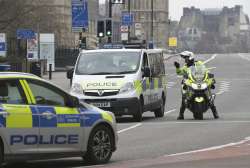London attacker identified as 52-year-old Khalid Masood, IS claims responsibility
British officials named the UK Parliament attacker as Khalid Masood, a 52-year-old with criminal convictions.

The Islamic State group today claimed responsibility for an attack by a knife-wielding man who plowed an SUV into pedestrians on Westminster Bridge and then stabbed a police officer to death at Britain's Parliament.
British officials named the attacker as Khalid Masood, a 52-year-old with criminal convictions, who was "inspired by international terrorism."
In a statement issued on Thursday, the police said that Masood was born in southeastern England and was most recently living in the West Midlands, in central England.
Police raided properties in London and Birmingham, and made eight arrests.
Police said that Masood, who had a number of aliases, wasn't the subject of any current investigation and that "there was no prior intelligence about his intent to mount a terrorist attack."
He had been arrested previously for assault, possession of offensive weapons and public order offenses.
His first conviction was in November 1983 for criminal damage and his last was in December 2003 for possession of a knife.
He once was under investigation for links to religious extremism, British Prime Minister Theresa May said Thursday in a sweeping speech before the House of Commons.
May set an unyielding tone Thursday, saluting the heroism of police as well as the ordinary actions of everyone who went about their lives in the aftermath.
The London attack echoed deadly vehicle rampages in Nice, France, and Berlin last year that IS has claimed.
The Islamic State group said through its Aamaq News Agency that the London attacker was a soldier of the Islamic State who "carried out the operation in response to calls for targeting citizens of the coalition" of countries fighting IS in Syria and Iraq.
The IS group has been responsible for numerous bloody attacks around the globe and has specifically called for Western followers to carry out this kind of attack in their own countries, though the group has also claimed events later found to have no clear links to it.
Police believe the attacker acted alone and there is no reason to believe "imminent further attacks" are planned, May said. He had been investigated before but police believed he was a peripheral figure, May said.
London has been a target for terrorism many times over past decades and the threat level for the British capital was already listed at severe, meaning an attack was "highly likely." Just this weekend, hundreds of armed police took part in an exercise simulating a "marauding" terror attack on a tourist boat on the River Thames.
May said the attack in London targeted "free people everywhere," and she said she had a response for those behind it: "You will not defeat us."
British security forces have foiled 13 plots in the past four years. There are currently thousands of extremists in the U.K. who are known to officials but only a fraction of whom are under surveillance, according to a security official who spoke on condition of anonymity because he was not authorized to speak about ongoing security operations. It takes dozens of officers to watch just one terror suspect.
May said people from 11 countries were among the victims. They included 12 Britons, three French, two Romanians, four South Koreans, one German, one Pole, two Irish, one Chinese, one Italian, one American and two Greeks required hospital treatment.
An Utah man visiting London with his wife for their 25th anniversary and a British woman who was a school administrator were killed by the SUV attack on Westminster Bridge.
(With AP inputs)
